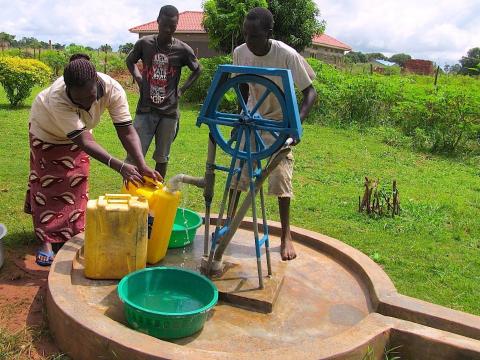How low-cost water pumps changed my life

HOW LOW COST PUMPS CHANGED MY LIFE
By Martha Kagimba
“We used to wake up very early in the morning to fetch water for the day’s work from a source that was 2km away from home. Since our children could not manage to do it alone, I would carry six jerry cans on my bicycle every day and head to the water source where I would spend a lot of time waiting as the place would be crowded. Life was not easy,” said Charles Watmon.
Mr. Watmon is one of the beneficiaries of the low cost pumps project in Gulu district. World Vision Uganda started this project in 2011 in the hope to provide affordable and sustainable water for the people of Northern Uganda.
The distance and the time spent waiting in line for the water was also a major issue according to Watmon in a way that many girls and young women would encounter rowdy boys who would insult and fight them. Many unfortunate times the girls would be raped and impregnated by these boys who would also infect them with sexually transmitted diseases such as syphilis and HIV/AIDS.
Additionally, Watmon’s family would have to forego some essential activities for example washing and showering as there would be no water to use luxuriously. “We used to wash only on the weekend,” he added. The scarcity of safe water in the district was a major cause of suffering to these people.
“I felt so excited in my heart when I heard about the low cost pumps offer” Watmon said excitedly, “I hurried to apply and take the forms back to the World Vision offices.” He was willing to pay for the pump as soon as possible since to him, this was an answered prayer as the water issue had always been a cause of dismay to him.
Charles Khiisa, the assistant engineer in charge of this project, said that the organization does not simply hand out the pumps to these people at no cost. Instead, they explain to the citizens the importance of the low cost pumps as well as how they work. Thereafter, they leave them to make the decision on whether or not to have the pumps constructed in their community. Each well costs two million shillings.
After signing the agreement, he returned home as the construction of the pump started almost immediately. “Four days later, the pump was up and although the water that came out first was not clean, at least we had running water at our disposal. Watmon paid for the pump using his own money but was also willing share the water with his fellow community members at a cost.
Khiisa referred to this as the private-shared category because here, one person drills the borehole but shares it with the community and pay monthly. Other categories of these pumps include private non-shared and community shared.
The private non-shared category refers to the people who drill their own borehole to use it only amongst their family members and are not open to sharing with the rest of the community. The community shared category on the other hand refers to where members of the community decide to come together and raise money to get a pump which they will all be using together.
“World Vision gives 25% subsidy to anyone who is willing to share the borehole so they pay 1.5 million as opposed to the 2 million shillings they would have paid if they wanted to use the water alone,” Khiisa said. He also added that World Vision has successfully constructed thirty-three wells in the Koro- Bobi ADP. Twenty five of these are private shared; five are community shared and the other three are private non-shared.
Since each well benefits twenty five households, a great number of people in this district have benefited from the WASH project. Other districts that have benefited from this project include Lira, Pader, and Luwero.
After two tests carried out by the Ministry of Health, the water from these low cost pumps was proved to be safe and clean for drinking and other domestic purposes.
Watmon is now able to cater for the domestic needs of his family as well as his animals. Some of which include pigs, goats, and cows which provide milk that he can sell and get money. Healso supplies water to the community and charges them a hundred shillings for each jerry can.
He went ahead to tell us that he uses the abundant supply of water for ploughing his gardens and also in the preparation of bio-gas which is passed through a pipe, underground into his house. He mixes the dung which he gets from his now healthy animals.
World Vision has also trained the residents of Gulu district on how to fix the pumps in case of any mishap. These pumps are therefore sustainable and will hopefully work for these people.
Watmon is very grateful to world Vision for introducing him to this innovation which has transformed his life totally for the better.